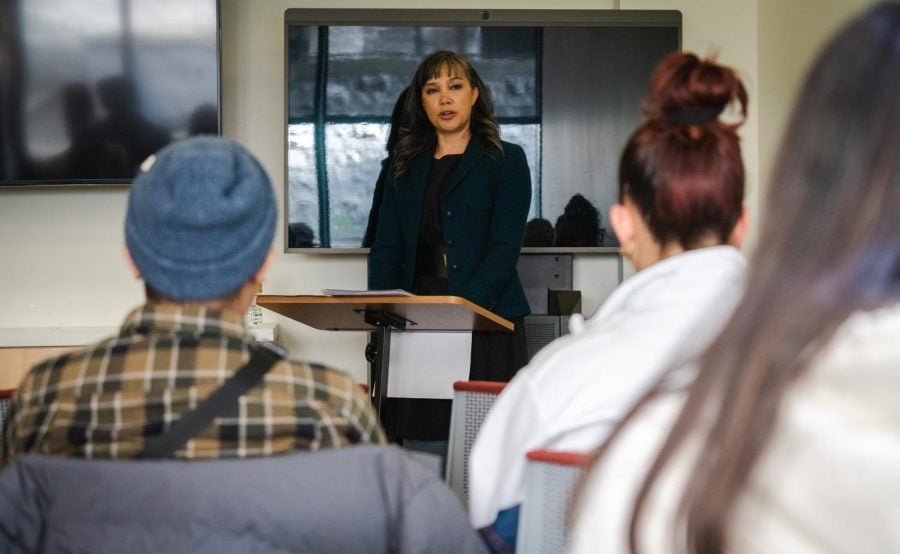University of Virginia Prof. Lisa Marie Cacho delivers talk on violence and settler colonialism against Native Hawaiians
Jonah Elkowitz/The Daily Northwestern
University of Virginia Prof. Lisa Marie Cacho stands in the middle of the frame, presenting to a group of faculty and students.
April 26, 2022
Content warning: this story contains mentions of police violence.
University of Virginia Prof. Lisa Marie Cacho discussed how the criminalization of houseless Native Hawaiians in Hawaii enforces settler colonialism in a Council for Race and Ethnic Studies event Tuesday evening.
Cacho began by recounting the police shooting of Delmar Espejo at the Hawaii Capitol Building in 2019. A deputy sheriff killed Espejo, a houseless Filipino man, after he allegedly held the officer in a chokehold. Cacho said police likely falsified accounts of the event and potentially distracted from the biases that caused the incident.
“What does the process of investigating the cover-up cover up?” asked Cacho, who teaches American Studies. “What if the truths that happened that night are less important than the reasons why he was able to be murdered and then ignored and then forgotten?”
Cacho’s talk addressed these questions as she examined the criminalization of houseless Kanaka Maoli people in Hawaii. She said she uses the word “houseless” rather than “homeless” since Hawaii is home for many of these individuals.
Cacho discussed past violent attempts to remove Kanaka Maoli individuals from their Native land, including those made by former Honolulu Mayor Kirk Caldwell.
“Caldwell’s administration is credited with using and changing laws to turn unhoused vulnerable people into criminals subject to arrest, imprisonment and ever-increasing fines they could not pay,” she said.
Cacho added the U.S. did not protect Kanaka Maoli’s property rights. When law enforcement evicted Kanaka Maoli people from their homes in Kalama Valley in the 1970s, she said their resistance “was not legible in self-defense law” as the state did not see them as owners of their land.
The state criminalizes houseless people and sometimes subjects them to violence due to its interpretation of land as property, Cacho said.
“Justifications for police killings of all marginalized groups in Hawaii rely on Western epistemologies and assume land is always and only property,” Cacho said.
According to Asian American studies Prof. Patricia Nguyen, an event organizer, the CRES has been more active in inviting speakers to campus recently.
Nguyen said the CRES welcomed its first keynote speaker, University of California, Riverside Prof. Dylan Rodríguez, last year and is hosting an event with artist William Estrada next week.
“Our hope is to bring in speakers who are scholars, artists and organizers who are at the forefront of really thinking about race and ethnic studies to come to campus to share with us their current research and work,” Nguyen said.
CRES invited Cacho because of her work regarding police and state violence through the lens of ethnic studies, Nguyen said. Cacho is currently working on a book project examining police killings in America.
Latino studies Prof. Elvia Mendoza said her students appreciated Cacho’s book, “Social Death: Racialized Rightlessness and the Criminalization of the Unprotected.”
“(Cacho’s work) interrogates the ways in which human value is both ascribed and denied relationally along racial, gender, sexual, national and spatial lines,” Mendoza said.
Email: pavanacharya2025@u.northwestern.edu
Twitter: @PavanAcharya02
Related Stories:
— Evanston Fight for Black Lives decries police violence in statement about Saturday NUCNC protest
— MSA hosts Indigenous Reading Series, discusses colonialism, indigeneity



